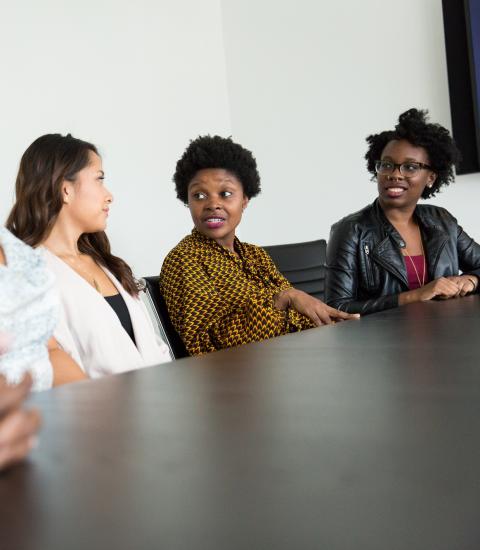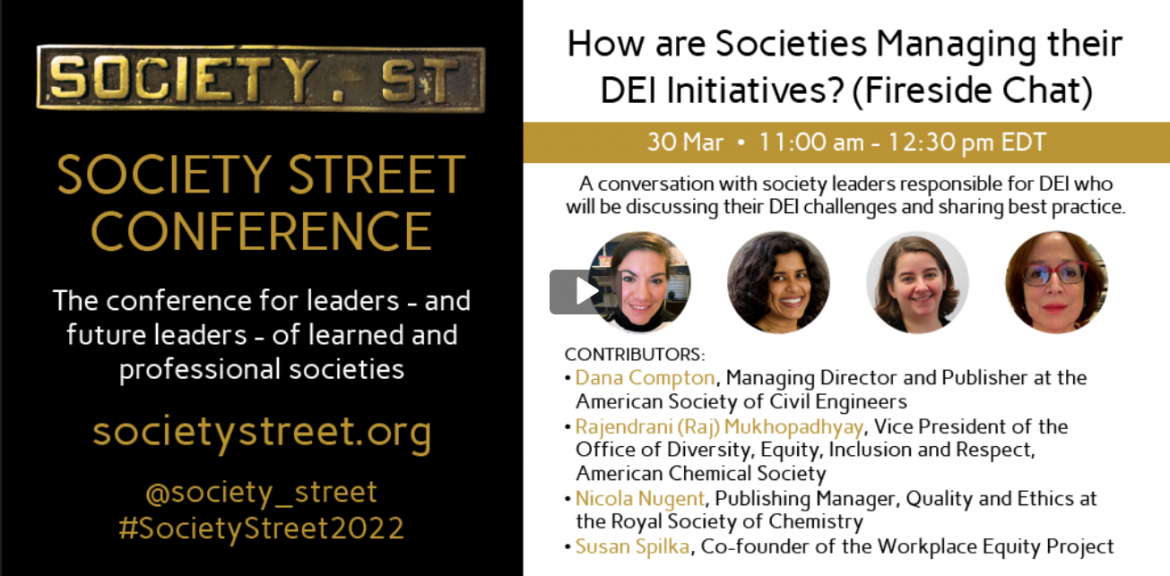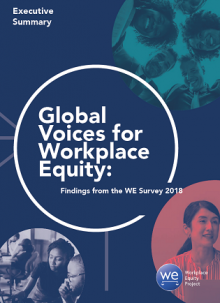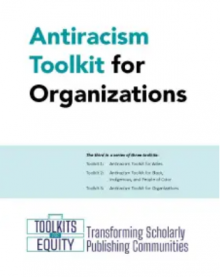
by Susan Spilka and Romana Labrosse, New York, USA
Diversity, equity, inclusion, and accessibility (DEIA) are among today’s most pressing issues for academic and professional societies, and indeed for society at large. With many societies focusing on DEI initiatives with their membership, leadership, and staff, the Society Street Webinar Series brought together four senior society and scholarly communication leaders in the DEIA space earlier this year to discuss challenges and share best practices. A summary of the event is shared in this blog post along with recommendations for addressing DEIA issues.
On 30 March 2022, a panel of scholarly experts gathered together to discuss the important topic of DEIA. The webinar was moderated by Dana Compton, managing director and publisher at the American Society of Civil Engineers, and the panelists included: Rajendrani (Raj) Mukhopadhyay, vice president, Office of Diversity, Equity, Inclusion & Respect, American Chemical Society (ACS); Nicola Nugent, publishing manager, Quality & Ethics, Royal Society of Chemistry (RSC), who leads the RSC’s Joint Commitment for Action on Inclusion and Diversity in Publishing; and Susan Spilka, co-founder of the Workplace Equity Project.
They spoke about their organizations’ approaches, shared details of initiatives and collaborations that the entire community could learn from, and addressed questions such as: “What does good practice look like within our space?” and “What should leaders be thinking about?”

Organize to advance DEI goals
Both the ACS and the RSC have laid strong foundations to address DEIA issues.
The ACS created an Office of DEIR (“R” stands for Respect) about a year ago, shortly after adding a new goal to its strategic plan: to embrace and advance inclusion in chemistry. The effort continues the society’s long-standing work in these areas, like its Women Chemists Committee, which is celebrating its 95th anniversary this year. The new organization formalizes DEIR as a priority and makes it the work of everyone, not just of certain groups.
The RSC’s Inclusion and Diversity team has an organization-wide strategy setting out a vision for improving inclusion and diversity, and ensuring that “chemistry is for everyone.” This is significant in itself, but the RSC team set their sights wider than their own organization by initiating the Joint Commitment for Action on Inclusion and Diversity in Publishing. This initiative grew out of RSC’s Framework for Action on Inclusion and Diversity in Scholarly Publishing, which it promoted throughout the community in 2020. The resulting discussions identified four areas where publishers could work together to improve DEIA in publishing more quickly. The joint commitment has grown into a collaboration of 50+ publishing organizations, from small society members to huge commercial publishers, all sharing resources and learnings to address mutual challenges.
One of the joint commitment’s early initiatives aimed to address the difficulty of collecting meaningful data around race and ethnicity – information that every DEIA team must have in order to advance inclusion and diversity but that can be very difficult to collect “universally” because race and ethnicity are classified differently in different parts of the world. Another initiative included setting minimum standards for inclusion and diversity data collection, which were published in April 2022.

Workplace equity
A grassroots initiative giving voice to individuals throughout the scholarly publishing community was organized by the Workplace Equity Project in 2018. The Workplace Equity (WE) Survey was conducted to create a baseline of data documenting the state of DEIA in the industry. The findings – based on data collected from 1,200 individuals, shared as an Executive Summary [1], and published in Learned Publishing in 2020 [2] – showed that:
- Organizations are not necessarily practicing what they preach.
- Individuals are often blind to the challenges of others.
- Managers can have a greater impact on individual experiences of inclusion than company policies.
- Awareness can make a real difference in debunking biases.
- Success will come when we change individual minds and organizational policies and structures.
In 2021, TBI Communications conducted a pared-down version of the WE Survey, which also addressed the impact of the pandemic. The results showed some small signs of progress but found metrics largely unchanged since the initial survey in 2018. You can read more here [3].
Take the first steps
You’ve begun to consider DEI issues within your organization, now what should you do next? What are the important points to take into consideration?
For ACS, listening was key. After the killing of George Floyd, the society’s executive leadership team issued a statement and held listening sessions with staff, which quickly identified the need for employee resource groups – “safe spaces” where employees could talk about how their identities impact their interaction with their workplace and how the workplace could be adjusted to improve those interactions. The WE Survey pointed to the need for active listening in “safe spaces,” preferably by a neutral third party, since some employees may not feel comfortable sharing their feelings with organizational management. RSC’s Joint Commitment underscores that “it takes a village,” meaning that success requires diverse contributions from all corners of our its community.
Other recommended early steps:
- Use data to drive your DEIA activities, whether from listening sessions or from more quantitative data gathering.
- Ensure leadership buy-in. If you encounter resistance, reinforce DEIA as an organizational strategic priority, share the data and evidence that highlight the issues and the need for action, and work on introducing behavioral changes through education – specifically, awareness that we all have our own internal biases that we must be willing to address.
- See what other organizations are doing successfully and learn from them. Collaborate to move things forward. Remember that you’re not alone.
- Use the various resources available to you, such as the Coalition for Diversity and Inclusion in Scholarly Communications (C4DISC)’s Toolkits for Equity.
- Look for common root causes so that you can address several issues with one initiative. For example, are the same people always invited to join committees, always nominated for awards, always up for leadership positions? Work on new approaches to identifying candidates.
- Don’t spread yourself too thin. Prioritize something that you can act on and start there.

Measure progress
Advancing DEIA is much more than just counting heads – it is ensuring that people have a sense of belonging and inclusivity to do their best. So, track the data to confirm that your organization is moving in the right direction, but also spend time listening to your community to discover whether their sense of belonging is growing over time.
Finally, don’t be afraid to make a mistake. Promoting DEIA takes courage – to ask questions, to speak up, to point out unfairness. In every conversation and interaction, be open and curious, but also be willing to learn, and always be respectful.
References:
1. “Global Voices for Workplace Equity: Findings from the WE Survey 2018,” Executive Summary of the Workplace Equity Project (Emerald Publishing; 2020); link: emeraldgrouppublishing.com/sites/default/files/2020-01/Workplace-Equity-Report.pdf (PDF) (last accessed: 27 June 2022).
2. Simone Taylor, Susan Spilka, Kristen Monahan, Isabel Mulhern, and Jeri Wachter, “Evaluating Equity in Scholarly Publishing,” Learned Publishing, 33(4): 353–367 (Wiley; 2020); link: doi.org/10.1002/leap.1301 (last accessed: 27 June 2022).
3. “Assessing the Impact of 2020 on DEI in Scholarly Publishing Results of our Vital Signs Survey” (TBI Communications; 2021); link: tbicommunications.com/2021/08/31/assessing-the-impact-of-2020-on-dei-in-scholarly-publishing (last accessed: 27 June 2022).



